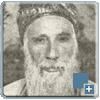A Short Tribute
Hacham Shimon Agassi, son of Aaron, was born in 1852 in Baghdad, Iraq. He came from a family of traders who dealt in importation from India and had moved to Iraq from Persia. At the age of 13, he was expected to leave his studies to work in the family business. Hacham Shimon Agassi, with the support of his parents but much to the chagrin of his brothers, chose to continue his Torah studies. His parents changed the family home's ownership and placed it in his name in order to secure his financial future.
In 1869, at the age of 17, he began to delve into the mystical aspects of Torah, as his commentary on Etz HaHaim shows. In 1878 his father died and the wonderful eulogy he prepared for the shloshim (the 30th day of the mourning period) has been preserved.
In 1879, Hacham Shimon Agassi married Rachel Czakhla, daughter of Abdallah Ben Aliah Bechar, and the couple had their first child, Aaron, in 1882. They had two more sons – Menasseh and Meir Hai Sasson, and two daughters – Freicha and Esther, but the younger sons died in childhood. The couple eventually had another son, named Ezra-Zion.
The family was again struck by disaster in 1898, when their eldest son died in an epidemic of plague on the eve of his wedding. Ten years later, in 1908, Hacham Shimon Agassi printed his book Bnei Aharon in his commemoration. He and his wife had three more daughters – Dinah, Katon and Mazal - and a son, whom they named Eliyahu-Haim.
Hacham Shimon Agassi continued his studies at the Hacham Yitzhak yeshiva headed by Hacham Yitzhak Mordecai Sasson, but strictly refrained from earning a livelihood from Torah and maintained his business dealings. He wrote sermons, booklets on halakha and religious laws, and commentary on mystical writings – Sha'ar HaGilgulim and Etz HaHaim. He jointly edited and published a new edition of Hacham Ovadia Somech's Zivhei Tzeddek with his friend Hacham Yehezkel Ezra Aliah. Hacham Yoseph Haim, who corresponded with him, refers to him as the MaHaRaSHa – an acronym for "our Teacher Sage Shimon Agassi".
In 1899 Hacham Shimon Agassi bequeathed the house he had inherited from his father to serve the community as a synagogue. The building was eventually donated to a public company to serve as a trade school. His friendship with Meir Eliyahu, the famous benefactor, led to the founding of many public institutions, such as a hospital in Baghdad and a yeshiva for outstanding students and rabbinic training. Meir Eliyahu made his donation for the establishment and maintenance of the yeshiva conditional on the appointment of Hacham Shimon Agassi as its head. On 13 Elul 5669 (1909), Hacham Yoseph Haim passed away. Hacham Shimon Agassi preached to a large audience and made a powerful impression on the community, who insisted that he don the Sage's robes - yet he stubbornly refused.
Hacham Shimon Agassi passed away on 8 Av, 5674 (1914), on the eve of the First World War. Among his books are Bnei Aharon, Imrei Shimon, Shem MeShimon, Zahav Sheva, and Kuntras Yesodei HaTorah.
